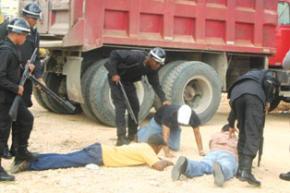Milk scandal in the Dominican Republic
and report on an embarrassing scandal for the government--and its crackdown on student protesters.
IN A story straight out of Upton Sinclair's The Jungle, a scandal over the quality of milk broke in the Dominican Republic at the start of June with dangerous repercussions for student activists.
The scandal began with a concerned parent's letter questioning the nutritional value of the "milk" served at her child's elementary school. The milk was tested by the Dominican Pediatric Society and its president, Dr. Tharsis Hernandez, noted that the Ministry of Education is serving "whey" or "sugar water." The drink does not have sufficient nutrients to be called milk.
Secretary of Education Alejandrina Germán is the minister in charge of the quality of milk served to students. Her daughter works in an administrative position with the supplier to milk to Dominican schools, Lacteos Dominicanos (Ladom).
Germán is known throughout the country as an arrogant, corrupt government official who has benefited from her high-level position by securing government jobs and scholarships in U.S. universities for her own relatives. When asked about the quality of the "milk," Germán declared that the liquid was not toxic.

The milk scandal shows what the government's priorities are. The government refuses to end its contract with Ladom. Instead, it has gone on the offensive to discredit whoever raises questions about a school breakfast program that serves fake milk to thousands of impoverished children.
STUDENT ACTIVISTS organized a campaign to fight back and put the Ministry of Education on trial. But on July 15, some 20 government thugs carried out a vicious attack against a delegation of left-wing student organizations that tried to summon Germán to appear at a symbolic people's trial, or juicio politico y moral, to be held July 22--and answer her role and for defending Ladom.
The beating, which left four student activists injured, took place in front of the Ministry of Education, and was witnessed by several journalists. The thugs also threw rocks and urine at activists. A police contingent present during the attack did nothing to stop it. Instead, police arrested the activists, though they were later released.
State repression in the Dominican Republic has made a comeback in recent years as part of the government's effort to suppress labor and immigrant rights struggles. Attacks on activists are carried out by criminal thugs, as well as police and military units trained by both the U.S. and Colombian militaries.
In addition, there has been a new wave of violent attacks on immigrant rights activists, independent journalists and labor organizers. And left organizations and liberal intellectuals fear for the life of Narciso Isa Conde, a left-wing activist whom the international media is accusing of aiding terrorists because of his political relationship with the Revolutionary Armed Forces of Columbia (FARC).
But the left is using the milk scandal to try to put the government on the defensive. La Multitud, one of the organizers of the people's trial, condemned the attack on the student activists and drew parallels between today's repression and state terror during the feared Trujillo dictatorship (1930-1961).
The milk scandal is part of a bigger scandal in which 1 million people in the Dominican Republic can barely afford to purchase basic staple foods. As the food crisis deepens, governments everywhere will try to crush any kind of organized dissent that fights for the right to eat and live a decent life. Events like the peoples' trial in the Dominican Republic are important because they expose the priorities of the government and can be a show of strength of the organized left.


